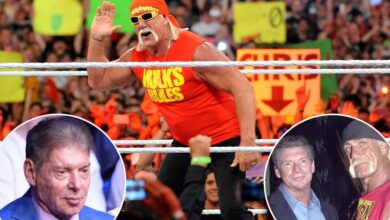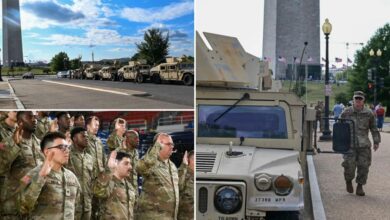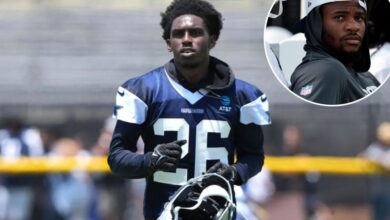ABC News anchor Linsey Davis reveals battle with uterine fibroids

ABC News anchor Linsey Davis is going public for the first time about her lengthy battle with uterine fibroids, a condition that has repeatedly disrupted her health and daily life.
“I suffered in silence,” Davis, the 47-year-old anchor of the Sunday edition of “World News Tonight” as well as a correspondent for “Good Morning America” and “20/20,” told People.
“It’s not something that I would talk to anybody about other than the gynecologist.”
Davis, who has built her career reporting on other people’s stories, is now telling her own, saying she hopes to help other women avoid suffering in isolation.
Fibroids are noncancerous growths that develop in the uterus and can trigger a range of symptoms, from heavy and prolonged periods to pelvic pain, bloating, constipation, and back discomfort.
While many women will develop them at some point, most don’t notice because they never experience symptoms.
For Davis, the condition became impossible to ignore. She first learned she had fibroids 13 years ago, when her doctor assured her the case was mild but warned that pregnancy could be difficult.
That prediction proved wrong.
A year after marrying husband Paul Roberts, Davis gave birth to their son Ayden in 2014. During the pregnancy, doctors monitored a fibroid growing alongside the baby but told her it would likely stop once the pregnancy progressed.
“That’s what happened,” she said. “I had my son and didn’t have any concerns.”
Six years later, everything changed. Davis began having extreme menstrual cycles lasting up to two weeks, marked by intense bleeding and severe bloating that made her look, in her words, six months pregnant.
Her gynecologist sent her to a fibroid specialist, and she underwent a myomectomy, a surgery to remove the growths while keeping the uterus intact.
Six fibroids were taken out, and for a time she was symptom-free.
But the relief didn’t last. About 18 months ago, Davis noticed a knot protruding from her lower abdomen. At first, doctors thought it was a hernia, but an ultrasound revealed it was fibroids again — this time about 13 of them.
Her doctors presented three options: another myomectomy; a uterine fibroid embolization (a procedure that blocks blood flow to the fibroids); or a hysterectomy, the complete removal of the uterus.
Only the hysterectomy would prevent new fibroids from forming.
Weighing her choices, Davis kept coming back to the toll the condition had taken on her.
“I just wanna get rid of them,” she told People.
The breaking point came in March, when she was co-hosting the Oscars pre-show. Her dress fit tightly around her bloated stomach, sparking online speculation that she was pregnant.
“It became this embarrassing thing,” she recalled. Already exploring treatment options, the public chatter “really intensified” her decision to act.
After researching, getting a second opinion, and meeting with a surgeon, Davis chose to have a hysterectomy.
“I don’t wanna have any more kids at this point,” she said.
“To me, that would be the only reason why I would’ve tried to do another method to preserve my uterus. But at this point, I just don’t think that I need it.”
Her surgery is scheduled for Friday.
The Emmy-winning correspondent is looking forward to a future without the cycles that have dictated her life.
“I will never miss having a period,” she told People, adding that buying what she believes is her last box of tampons felt like a milestone.
“I’m excited to be able to live my life without having to schedule and plan and worry and be anxious that I’m gonna have this heavy bleeding and excessive bloating and this uncomfortable menstrual cycle every month. I feel confident that my life will be better.”
Davis also wants to use her platform to highlight how common fibroids are, particularly for black women. Research shows that more than 80% of black women and about 70 percent of women overall will have fibroids by age 50.
For years, she simply endured the pain, normalizing it and telling herself to keep going. Looking back, she wishes she’d known how many other women were facing the same problem.
“If I had known earlier what I was dealing with and known other people’s stories, I wouldn’t have felt like I was suffering silently or embarrassed about what I was going through,” she said.
Now, she says, the best approach is openness — sharing experiences and advice instead of struggling alone.
“I just feel like that is a healthier approach rather than just trying to, on your own, solve for x.”
Ahead of her surgery, Davis is taking part in a conversation that will air soon, sitting down with gynecologist Dr. Soyini Hawkins, singer Tamar Braxton, and former “Real Housewives of Atlanta” star Cynthia Bailey — all of whom have faced their own fibroid challenges.
The Post has sought comment from ABC News.
Credit to Nypost AND Peoples




